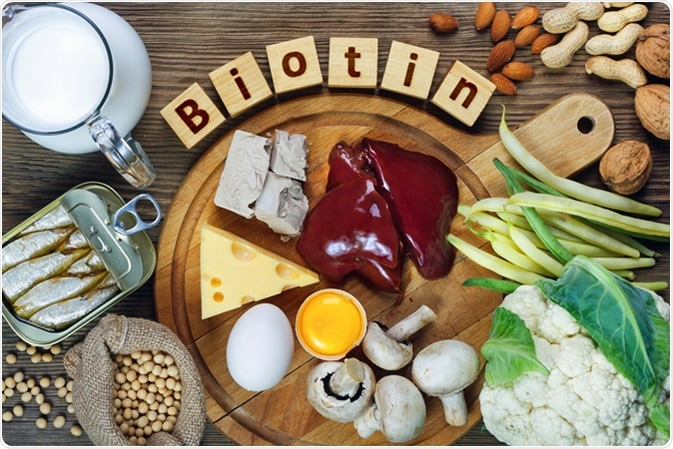Biotin (Vitamin B7)
People often take biotin supplements to nourish their hair, nails and skin, although strong evidence for these benefits is lacking. In fact, it was historically called vitamin H after the German word haut, meaning “skin”.
Types
Biotin is either found in its free form or bound to proteins.
When proteins that contain biotin are digested they release a compound called biocytin. The digestive enzyme biotinidase then breaks biocytin into free biotin and lysine, an amino acid.
Role and Function
Same as all B vitamins, biotin functions as a coenzyme. It is required for the function of five carboxylases, enzymes involved in several fundamental metabolic processes.
For instance, biotin serves an essential role in fatty acid synthesis, glucose formation and amino acid metabolism.
Dietary Sources
Compared to the other B vitamins, biotin doesn’t have as much research behind its content in food.
Animal-sourced foods rich in biotin include organ meats, fish, meat, egg yolk and dairy products. Good plant sources include legumes, leafy greens, cauliflower, mushrooms and nuts.
Your gut microbiota also produces small amounts of biotin.
Recommended Intake
The table below shows the adequate intake (AI) for biotin. The AI is similar to the RDA, but is based on weaker research.
AI (mcg/day)
Infants 0–6 months 5
7–12 months 6
Children 1–3 years 8
4–8 years 12
9–13 years 20
Adolescents 14–18 years 25
Adults 19+ years 30
Pregnancy 30
Lactation 35
Deficiency
Biotin deficiency is relatively uncommon.
The risk is greatest among infants who are fed formula low in biotin, people taking antiepileptic medications, infants with Leiner’s disease or people who are genetically predisposed to deficiency.
Untreated biotin deficiency can cause neurological symptoms, such as seizures, intellectual disability and loss of muscle coordination.
Deficiency has also been reported in animals fed high amounts of raw egg whites. Egg whites contain a protein called avidin, which prevents the absorption of biotin.
Side Effects and Toxicity
Biotin does not have any known adverse effects at high doses and the tolerable upper limit has not been established.
Benefits of Supplements
Limited evidence suggests that biotin supplements may improve health in those who otherwise get adequate amounts from their diets.
For instance, studies suggest biotin may improve symptoms in people with multiple sclerosis (MS).
Observational studies also indicate that biotin supplements may improve brittle nails in women. However, higher quality studies are needed before any claims can be made.
Summary of Biotin
Biotin, also known as vitamin B7, is a coenzyme required for many key metabolic processes.
It is found in a wide range of foods. Good sources include organ meats, egg yolk, meat, legumes, cauliflower, mushrooms and nuts.
Deficiency is uncommon and adverse effects are unknown, even at high supplemental doses. Further studies need to establish the tolerable upper intake level.
Limited evidence supports the use of biotin supplements among people who already get adequate amounts from their diets. However, a few studies suggest they may improve the symptoms of MS and strengthen brittle nails.

